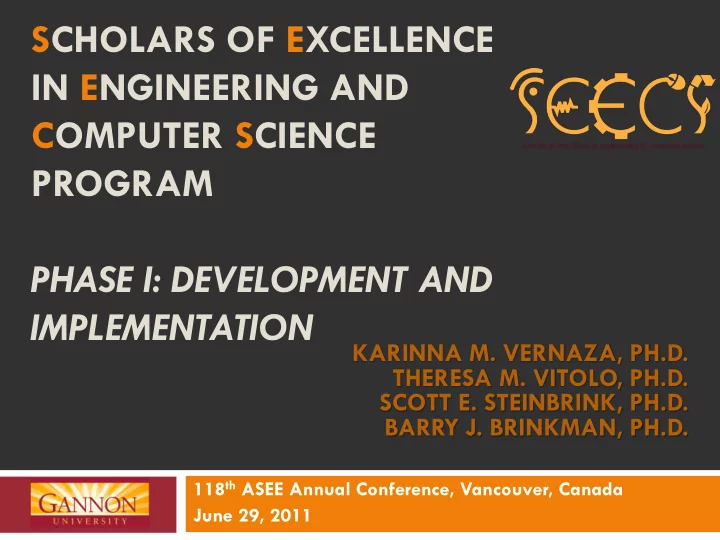

SCHOLARS OF EXCELLENCE IN ENGINEERING AND COMPUTER SCIENCE PROGRAM PHASE I: DEVELOPMENT AND IMPLEMENTATION KARINNA M. VERNAZA, PH.D. THERESA M. VITOLO, PH.D. SCOTT E. STEINBRINK, PH.D. BARRY J. BRINKMAN, PH.D. 118 th ASEE Annual Conference, Vancouver, Canada June 29, 2011
Outline NSF S-STEM Grant Objectives Seminar Experiential Activities Design Personal Professional University Support Implementation Majors Survey results Lessons Learned and Future Plans
From Small Acorns…. Original idea Fund Engineering Summer Camp NSF, Directorate of Undergraduate Education Scholarships in Science, Technology, Engineering and Mathematics (S-STEM) Applied in November 2007 Grant of $600,000 awarded in July 2008
Goals Increase academically talented, financially disadvantaged Assist students through graduation Scholarships Academic Support Foster professional development
Objectives #2 #3 #4 #1 • Support • Build • Offer • Enable 20 referral program professional students network of student development • Per year `` service • Target support graduate • Target studies or 90% employment retention
Seminar Activities Each semester of the seminar includes three components Design 50% of the semester meeting time Two class-cohorts working together Professional development Personal development
Seminar: Semester Schedule Week Type Class-Cohort 1 Introduction / Lecture All scholars 2 Workshop Pers. Dev. Individual academic levels 3 Social All scholars 4 Design Freshmen and Seniors / Sophomores and Juniors Freshmen and Seniors / Sophomores and Juniors 5 Design Freshmen and Seniors / Sophomores and Juniors 6 Design 7 Speaker All scholars 8 Fall Break 9 Design Freshmen and Seniors / Sophomores and Juniors 10 Workshop Prof. Dev. Individual academic levels 11 Design Freshmen and Seniors / Sophomores and Juniors 12 Seminar / Social All scholars 13 Design Freshmen and Seniors / Sophomores and Juniors 14 Thanksgiving 15 Design All scholars 16 Dinner Pers. Dev. All scholars
Two-Year Design Sequence First Year Second Year (Conceptual Design; (Embodiment Phase; Seniors mentor Juniors mentor Sophomores) Freshman) Fall Defining a Project Analysis of Design Alternatives Design Perspectives Develop Models Understanding Constraints Test Models Proposing Design Alternatives Selection of Design Concept Measuring Risks and Success Design Perspectives Spring Expectations Change Management Development of Design Solution Freshman Design Projection Testing in-situ Implementation of Design Solution Evaluation of Design Solution
Completed Design Projects: Boat Launch Ramp Stakeholder : Bayfront Center for Maritime Studies Completed in Academic Year 2009-2010
Completed Design Projects: Bicycle Powered Generator Stakeholder : Service Learning Office, Gannon University Completed in Academic Years 2009-2011
Current Design Projects: Sediment Capture Device Stakeholder : Started Fall 2010 Estimated Completion: May 2012 Build a device to capture sediment Collect sediment for analysis (2 liters) Determine stream flow Identify pollutant load
Professional and Personal Development Objective : Develop life-long, life-enriching, life- balancing skills in the scholars Adapted LIFECORE, Gannon University’s approach for fostering holistic development
Professional Development SEMESTER ACTIVITY CLASS-COHORT / SEMESTER-FOCUS Workshop: You and Your Academics; Freshman / Fall Career Assessment Inventory 4-Weeks of Co-Op Preparation Course; Freshman / Spring Resume Preparation Interview of Professionals in Career Path Sophomore / Fall Resume Refinement; Career Fair Attendance Sophomore /Spring Interview Preparation; Mock Interview; Junior / Fall Graduate School Fair Attendance GRE or GMAT Practice Exams; Conference Attendance; Junior / Spring Active Participation at Career Fair Workshop: You and Your Job ; Senior / Fall Active Participation at Career Fair Workshop: Job Searching ; Conference Presentation; FE Senior / Spring or Certification Preparation and Testing
Professional Activities
Personal Development CLASS-COHORT / SEMESTER ACTIVITY SEMESTER-FOCUS Learning Styles Inventory Freshman / Fall Stress Management Training Freshman / Spring Meditation Technique Training Sophomore / Fall Workshop: Emotional Intelligence Sophomore /Spring Mock Interviews Junior / Fall Workshop: You and Your Peers Junior / Spring Exploration into Individual Attributes & Values Senior / Fall LifeCore Assessment with Work-Week Senior / Spring Visualization
And the “FUN” Component First Year Second Year Fall General Dining Etiquette Professional Attire Spring International Dining Etiquette International Dining Awareness
University Support Services Affiliated Marketing Academic Departments Admissions Student Success Student Organizations Center and Leadership Development Financial Aid Office of Career Service Placement Learning
First Two Years of Implementation Patterns of applicants Major selection Academic quality Geographic distribution Satisfaction of scholars
Selected Majors 60 55 50 45 40 35 Percentage 30 in Major 25 20 15 10 5 0 Computer Electrical & Environmental Mechanical Software Information Science Computer Engr. Engr. Engr. Systems Engr. SEECS Scholarship Applicants, 2009 & 2010 Freshmen 2010 Enrolled, Engineering & Computer Science Overall
Academic Quality Average Average Acceptance High School High School GPA Number of Rate by GPA of of ECS Freshmen Semester Applicants Applicants Applicants 2010 Fall 09 18 44.44% 3.93 Fall 10 14 42.86% 3.95 3.56 Fall 11 16 50.00% 3.76
Geographic Distribution Number of Percentage of Percentage of Miles from SEECS SEECS Freshmen 2010 University Applicants Applicants Enrolled, ECS 5 10 21.74% 28.26% 15 3 6.52% 2.17% 20 2 4.35% 4.35% 100 10 21.74% 32.61% 200 17 36.96% 15.22% 300 2 4.35% 6.52% 700 2 4.35% 10.87%
End-of-Year Assessment STRENGTHS WEAKNESSES Overall – on all items Marketing Strongly Agree or Agree Intercohort interactions Satisfied with seminar Appreciated engineering design Increased awareness of interdisciplinary interactions in engineering Provided professional experiences
Lessons Learned Be aware of Admissions Office interests and ensure control over scholarship acceptance Work closely with Financial Aid Office Track carefully students’ progress Provide enough opportunities for cross-cohort bonding
Future Plans Strengthening of the relationship between SEECS and school districts Intermediate Unit 5 Education Specialist at Local High Schools Use SEECS program to enhance minority and women representation Apply for renewal of NSF S-STEM funding Model for Engineering Honors Program
Acknowledgement
Recommend
More recommend